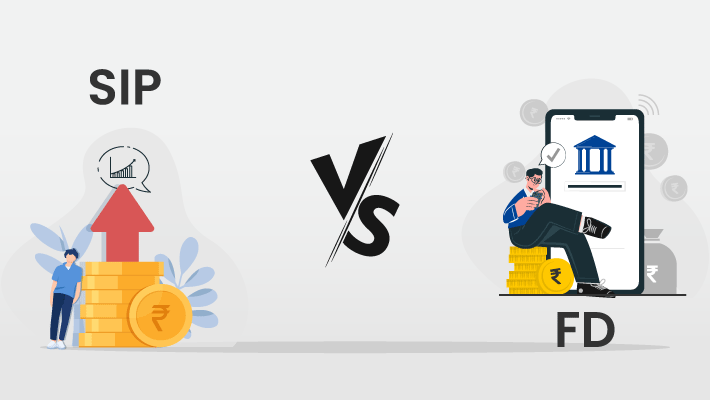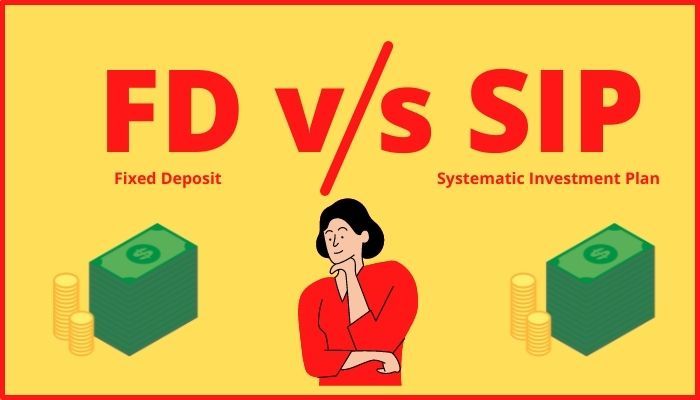Which is a Better option for Investments: For Indian investors, fixed deposits, or FDs, are the most dependable and conventional financial products. Nevertheless, as fintech advances, investors are looking for alternative investing options, such as mutual funds, that offer greater portfolio control and a potential for higher returns.

A systematic investment plan (SIP), which enables you to begin investing in mutual funds even with a little amount, is another relatively recent investment option that you may want to take into consideration.
You could become perplexed by the abundance of options, particularly the differences between FDs and SIPs. Many people question whether SIP is superior to FD since both are investment vehicles.
To help you choose between the two investing possibilities, we have included a full study.
Which is a Better option for Investments-
What is an FD Investment?
An investment account with a lump sum that you open with a bank or non-banking financial company is called a fixed deposit (NBFC). Depending on your financial objectives, you can invest a set amount in an FD with the financial institution for a period of time ranging from seven days to ten years.

You are paid a set interest rate on your investment by the bank or the NBFC, which is determined at the time the FD account is opened. Market volatility has no bearing on FD returns, and you will always get the predetermined rate of return regardless of any changes made to FD interest rates after opening your FD account by the bank or NBFC.
You can receive tax benefits by investing in a tax-saving* fixed deposit for a minimum of five years, which will enhance the benefits of FDs. Preserving capital is a fixed deposit’s main objective.
What is a SIP Investment?
In essence, a systematic investment plan is a method of investing that enables you to make regular, fixed-sum investments into debt or equity mutual fund schemes. For those who are new to the stock market and do not want to make a large lump sum investment all at once, SIP investments are perfect.

SIPs are goal-oriented investments that support the formation of a disciplined, timely, small-amount saving habit. Additionally, if you invest in SIPs for a year or longer, you may benefit from tax advantages on your contributions.
SIP vs FD: The Difference between an FD and SIP?
Which is a Better option for Investments

- Suitable For:
A fixed deposit is better suited for people who typically take conservative positions and hedge their bets. Conversely, SIPs are flexible and suitable for both conservative and aggressive investors.
- Risk:
Investing in fixed deposits carries little risk. They provide a fixed rate of regular interest payout. However, SIP is a method of making market investments. The associated risk rises as a result.
- Returns:
You can be confident that an FD will yield returns in the form of consistent, fixed-rate interest payouts. Nonetheless, the fluctuations in the market determine the returns on SIP. Higher returns can be obtained from your SIP when the financial markets are doing well.
In general, both investment options—SIP and FD—have advantages and disadvantages. Even though an FD is a safer option, SIP may require you to take on more risk but also offers the potential for greater rewards. In the end, you have to weigh the pros and cons of FD vs SIP and decide according to your financial objectives, risk tolerance, and careful investigation.
Is SIP Better than FD?

First of all, SIP is an investment process, wherein investments are made at regular intervals and in equal portions, whereas FDs are investment tools. These two might be a little unfairly compared. However, it is a fact that a lot of people mistakenly associate SIPs with mutual funds, using the terms virtually synonymously.
- You can select the option that best fits your investment needs from among SIPs and FDs, each of which have special features and advantages.
- You can take into account the following factors to help you decide between the two options:
- You can choose a FD if you are a conservative investor who does not want to risk his hard-earned money. On the other hand, a SIP is for aggressive investors who want higher returns and are ready to take moderate to high risk on their investment.
- If you want to invest a lump sum amount, you can invest in an FD. If you want to start investing small amounts of money at regular intervals and do not want to make a large investment, you can invest in a SIP.
Read Also: Why is Mukesh Ambani more successful than Anil Ambani!











